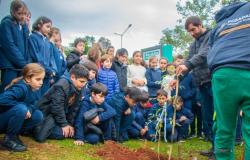Officials and employees of the Municipality of Rawson will receive training on environmental issues by the Government of Chubut. In this way, the management of Governor Ignacio “Nacho” Torres, through the Secretariat of Environment and Control of Sustainable Development, complies with National Law No. 27,592 and Provincial Law No. XI 73.
Specifically, through an agreement signed between the Secretary of Environment and Control of Sustainable Development of Chubut, Juan Rivera, and the mayor of the city of Rawson, Damián Biss, the capital of the province adhered to the Comprehensive Environmental Training, known as “Yolanda Law”, which is promoted and coordinated by the Government of the Province through the Directorate of Education and Environmental Communication, in the Virtual Campus of the environmental portfolio.
After the event, Rivera indicated that “it is important that the capital city is joining this initiative, which we publicly announced last week in Esquel, where more than ten locations joined.” And he highlighted that “as was said on that occasion, the Yolanda Law is extremely necessary so that we are all aware of caring for the environment and assume our responsibilities.”
The signed Agreement emphasizes that the standard “aims to guarantee comprehensive training in the environment, with a perspective of sustainable development and with special emphasis on climate change for people who work in public service.”
Scopes
Within the framework of the agreement, the environmental portfolio undertakes to assist the municipality in all aspects related to the implementation of Training in its area of responsibility and to provide technical assistance and training to municipal representatives for access to the Virtual Campus.
In addition, you must keep the Virtual Campus operational with the training contents, which are distributed in mandatory and optional modules, as well as their respective evaluations and associated bibliography.
On the other hand, the municipality undertakes to promote actions so that municipal employees carry out the training and guarantee its mandatory nature.
Training Features
The training is developed through several modules covering general concepts such as climate change, protection of biodiversity and ecosystems, energy efficiency and renewable energies, the circular economy and sustainable development, as well as current environmental regulations.
At the same time, it develops topics of special interest for the province such as the preservation of forests and fire management; the care of water and water resources; as well as environmental education and citizen participation.
The activities to be developed invite us to reflect on the comprehensive and interdisciplinary approach that environmental problems require to contribute, from state management, to the construction of sustainable territories of life and propose to understand the need to adopt environmental policies to protect common goods.
The teaching team is made up of 40 experts from different organizations of the National and Provincial State, the academic sector and civil society who selflessly collaborated in the preparation and teaching of their specific topics.






